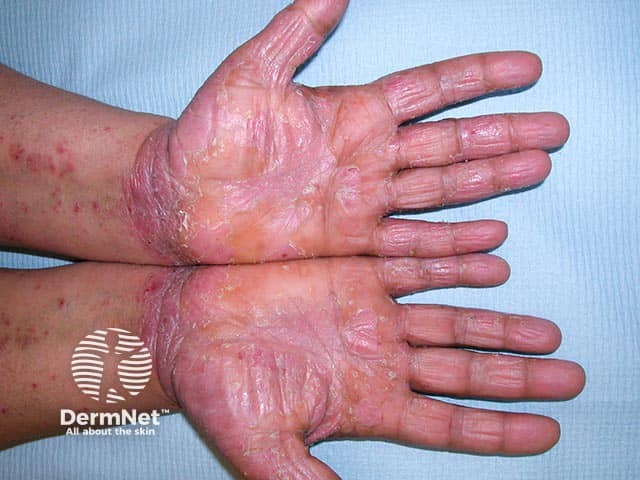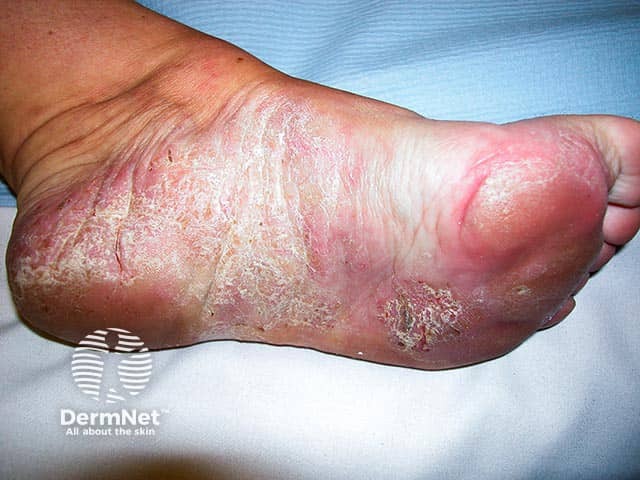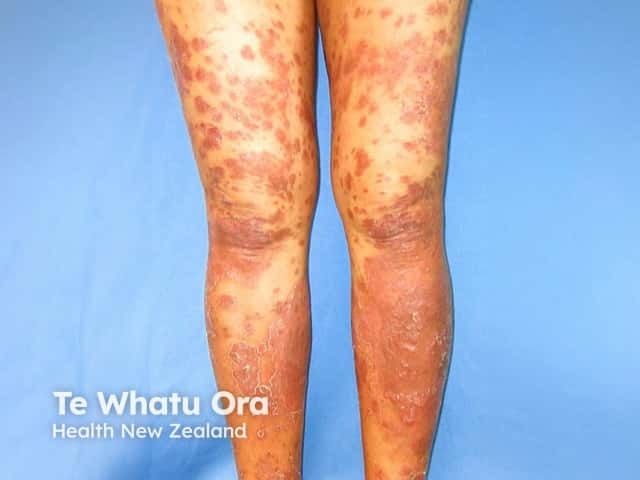Main menu
Common skin conditions

NEWS
Join DermNet PRO
Read more
Quick links
Authors: Dr Sabrina Sapsford, Research Fellow, University of Auckland; Dr Nicholas Turnbull, Dermatologist, Auckland, New Zealand (2023)
Reviewing dermatologist: Dr Ian Coulson
Edited by the DermNet content department
Introduction Demographics Causes Clinical features Variation in skin types Complications Diagnosis Differential diagnoses Treatment Prevention Outcome
Paradoxical psoriasis is a drug side effect that results in the formation of red, scaly, psoriasiform plaques on the skin due to treatment with tumour necrosis factor alpha (TNFα) inhibitors.
TNFα inhibitors are used to treat autoimmune conditions such as inflammatory bowel disease, rheumatoid arthritis, and psoriasis. They can improve quality of life, reduce hospitalisations, and in some cases achieve remission. However, they have been associated with psoriasiform-like reactions and new-onset psoriasis, with the first case report in 2004.

Bilateral psoriatic eruption that arose during adalimumab treatment for inflammatory bowel disease

Psoriasiform eruption that arose 7 months after initiation of adalimumab for inflammatory bowel disease

Pustular paradoxical psoriasis arising during TNF inhibitor treatment
Studies show that 2–5% of patients who receive TNFα inhibitors may develop paradoxical psoriasis. The incidence rate is higher in women, and in smokers and ex-smokers, although the absolute risk remains low.
Patients affected by paradoxical psoriasis tend to be in their fourth or fifth decade.
The aetiology of paradoxical psoriasis is not fully understood. Classical psoriasis is an autoimmune, T-cell-mediated disease. In contrast, paradoxical psoriasis may be caused by an exaggerated interferon response without T-cell induction.
There does not appear to be a dose-response relationship between anti-TNF agent use and the risk of paradoxical psoriasis.
Most patients with paradoxical psoriasis develop plaque psoriasis. However, some patients develop pustular or palmoplantar psoriasis, and TNFα inhibitor exposure is a risk factor for these types of psoriasis.
Plaques may be erythematous or violaceous in colour depending on the Fitzpatrick skin type. The distribution of psoriasis may also differ in darker skin; further studies are needed.
Psoriasis is a clinical diagnosis, and the temporal association with anti-TNF treatment may help diagnose paradoxical psoriasis.
A skin biopsy may help distinguish paradoxical psoriasis from other skin problems.
Because classical psoriasis is generally associated with alcohol excess, depression, sleep disturbance, and metabolic syndrome, these conditions should be well-managed in patients being treated for paradoxical psoriasis.
There is no known preventative strategy for paradoxical psoriasis.
The approach to treatment for patients who need TNF inhibitors should remain the same. The absolute risk of paradoxical psoriasis is low. In most patients, if skin lesions develop, these can be controlled with topical steroids.